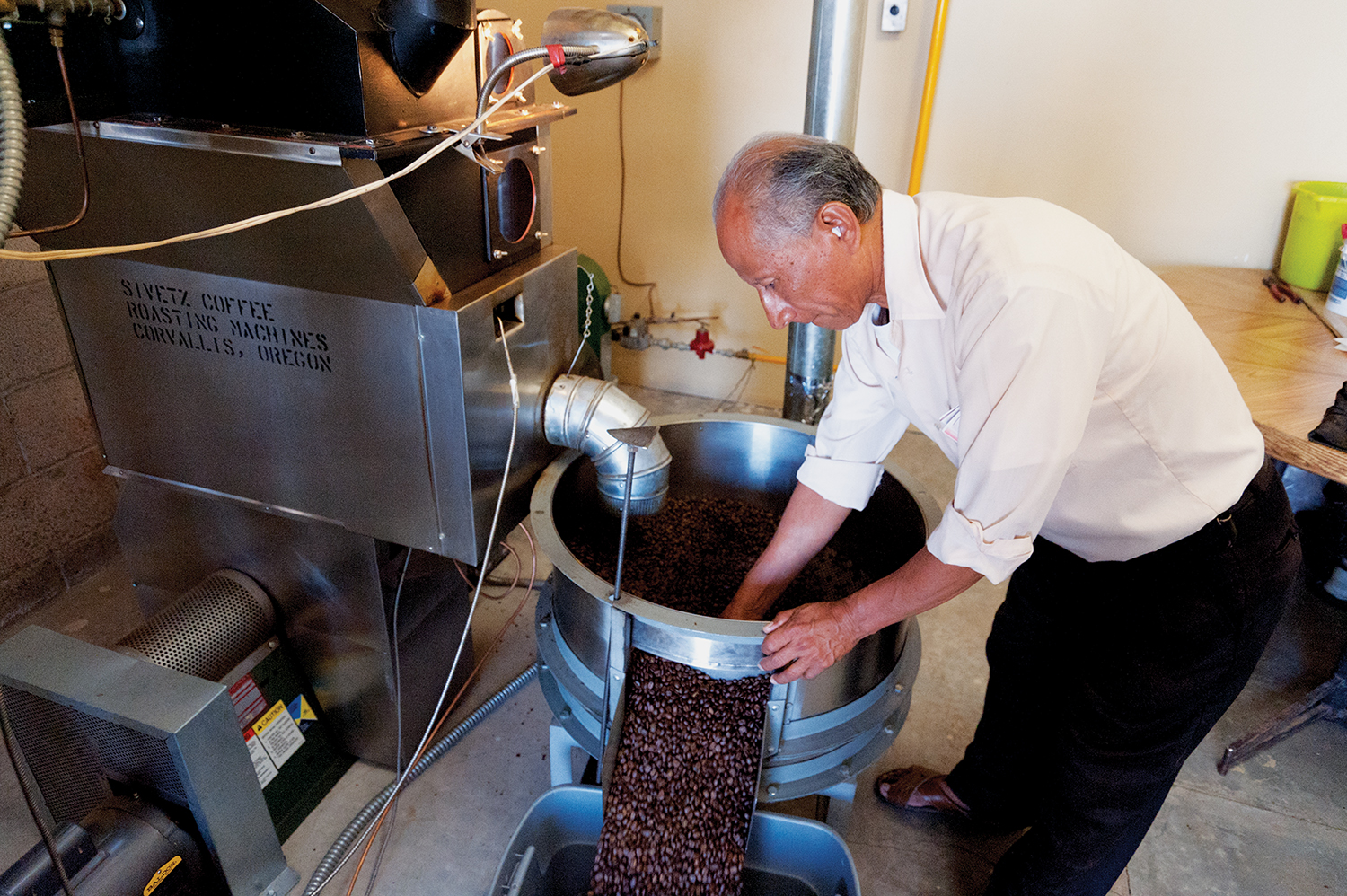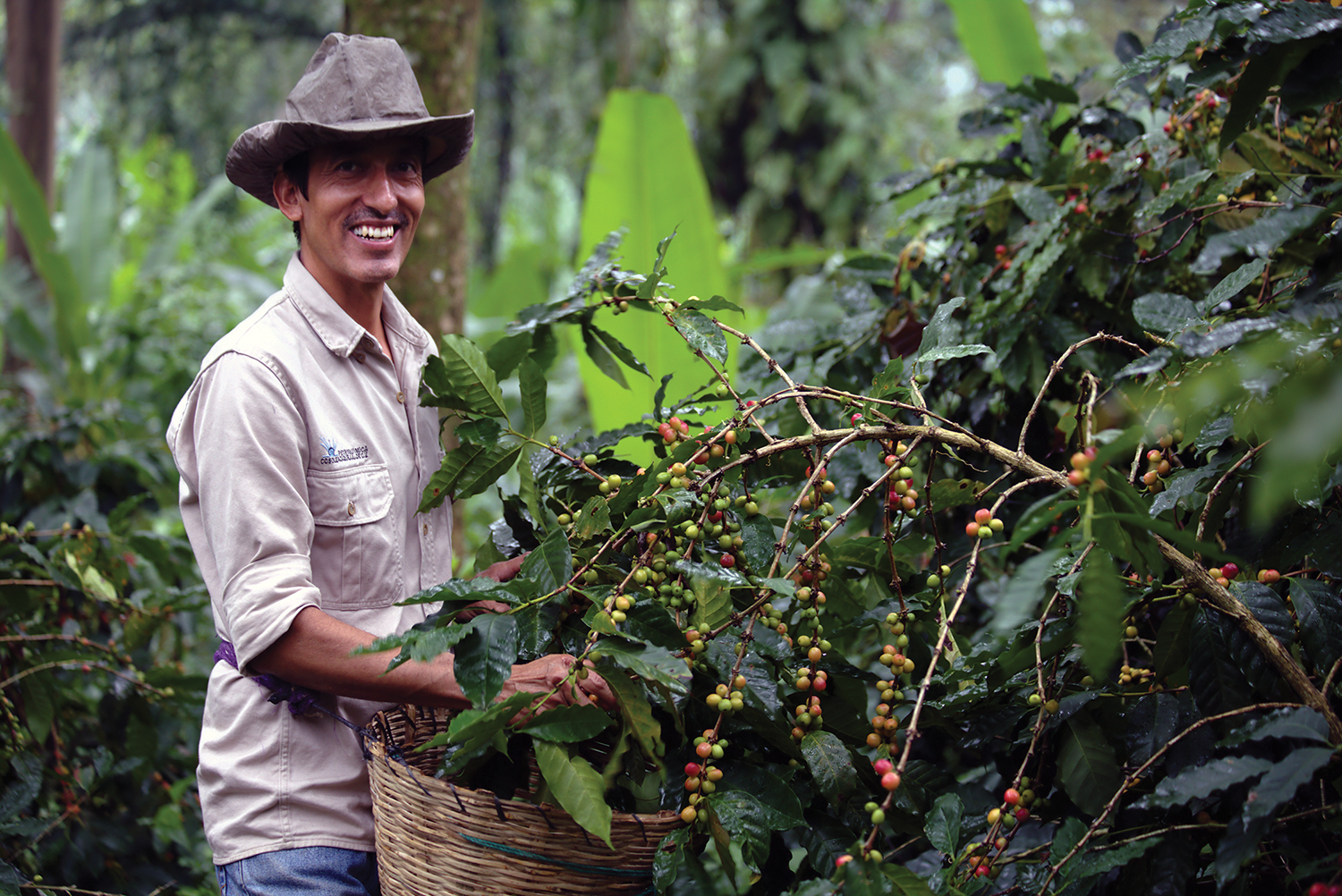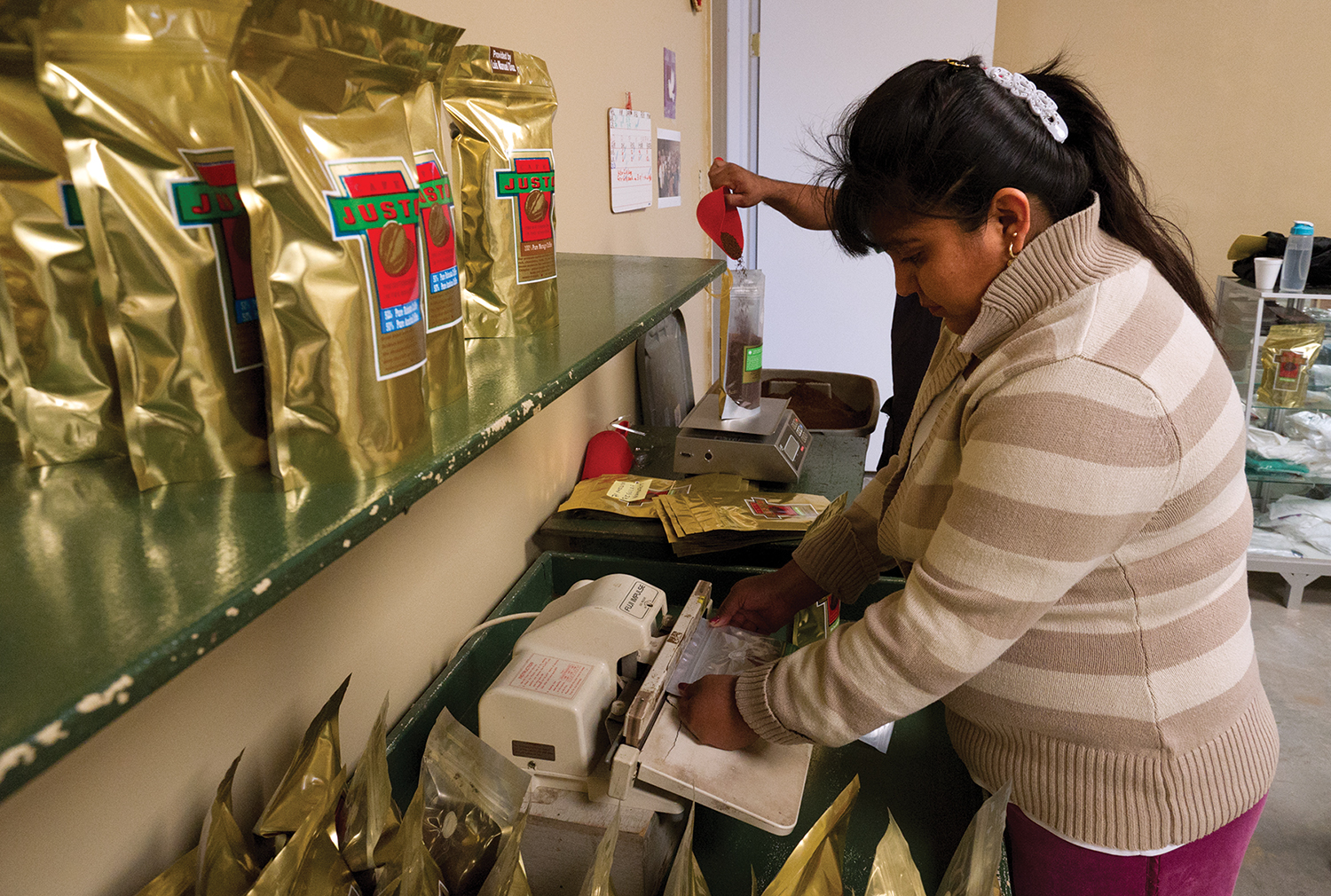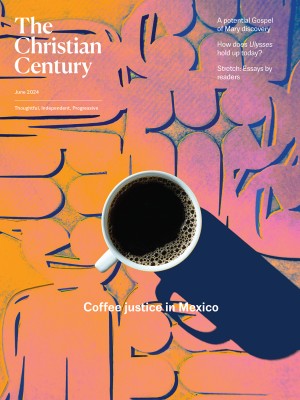Coffee justice in Mexico
Café Justo’s alternative to the fair trade model keeps the means of production—and most of the profit—in the local community.

Illustration by Daniel Richardson
Though the coffee at the hotel was bland and stale, the carafe bore a label indicating that this was no ordinary brew. “Rainforest Alliance Certified,” it said. A few hours later, on an airplane on my way to Agua Prieta, Sonora, Mexico, my coffee cup was marked with a label that said “Community Coffee” and noted that the airline selected its coffee in order to “do good.”
That’s a lot of angst for an ordinary drink that is part of the everyday life of 62 percent of Americans. I noticed it because I was on my way to visit Café Justo, a coffee company started by coffee farmers in Chiapas, their migrant relatives in the border town of Agua Prieta, and the Presbyterian church on both sides of the border. Americans have gotten the message that there is a problem with coffee, and Café Justo is linking the personal with the social in order to try to give them an answer to what troubles them.
Read our latest issue or browse back issues.
Coffee is a unique site for doing so. Coffee rituals are as personal as they are ubiquitous. Every morning, I sit down with a cup of coffee and my notebook in one of my most central and intimate rituals of the day. To make the coffee, I hand grind the beans and steep the coffee in an insulated French press. I carry the coffee to my desk, and for almost an hour, I sip and I write. My husband carries his coffee to the living room, where he drinks with the dog curled up next to him and reads the New York Times. Another friend of mine prepares her coffeepot the night before, so that when she gets up for her early Zoom meeting, she can carry a cup to accompany her.
As I looked around the airplane, indulging my caffeine addiction even without my hand grinder, I wondered about the coffee drinking rituals of each of the passengers, the coffee shops they might frequent, the person who maybe brings them coffee in bed, the people in their lives that coffee connects them to. Coffee inspires rituals of connection and rituals of pleasure. There are few things, in my life anyway, that are as ritualized.
The United States is the world’s number one consumer of coffee. It imports 22 percent of the world’s coffee. Coffee grows in some of the world’s poorest countries and then flows, almost as fast as oil, to some of the world’s richest countries. Awakening to this reality and the deep history of colonialism and exploitation rooted in coffee, the fair trade movement has tried to get the message out: how you buy your coffee, how it is grown, and who gets the profit are matters of vital importance. Fair trade has had a small impact on the coffee industry as a whole—it accounts for less than 5 percent of a $14 billion industry—but it has had a strong impact in making some US consumers aware that the origin of their beloved coffee is marred by economic and environmental problems.
Café Justo, however, has gone further, diagnosing the problems that exist even with fair trade coffee and coming up with an alternative model. Whereas the fair trade model pays farmers a guaranteed price for their crops, Café Justo keeps the entire means of production in the hands of farmers, from the moment of planting to the moment the consumer enjoys a cup of coffee. They call this “vertically integrated direct trade.” Once you know that this experience is possible—that you can connect your coffee drinking rituals in a direct way to the farmers who grew the bean, the land on which it grew, and the people who roast the bean—it is pretty hard to say no. It is easy not to care about those things if you have no real way to connect them. But once you know you can? There is something almost irresistible about that.

At Café Justo headquarters in Agua Prieta, Daniel Cifuentes dips his hand into a burlap sack of green coffee beans to show me the difference between the smaller robusta bean and the larger arabica bean. Coffee growers in Cifuentes’s native Salvador Urbina, more than 1,750 miles to the south of this border town, have been growing both since the late 19th century, when they transitioned from maize to what was then a more lucrative crop in coffee.
Cifuentes shows me in photographs how the beans are fermented and dried before being delivered to Agua Prieta, where they are roasted, packed, and shipped to customers all over the United States.
Cifuentes grew up in Salvador Urbina. His family were members of the Presbyterian church there and coffee farmers going back generations. When Cifuentes was growing up, farmers in Salvador Urbina could sell a 50-kilogram sack of raw coffee beans for 1,350 pesos, or $130. “That was a lot for us,” he said. But after the fall of prices in the 1990s, they could get just $33 a bag.
Adrián González, Café Justo’s customer relations director, later explained what caused this precipitous fall. After the North American Free Trade Agreement took effect in 1994, both the United States and Canada protected their farmers with subsidies against the vagaries of the market—but Mexico did not. Meanwhile, in the economic chaos after NAFTA, the peso was devalued against the dollar: two pesos to one dollar fell to 20 pesos to the dollar. In a perfect storm, at the same time, the World Bank helped Vietnam set up as a coffee- growing country, and Vietnamese coffee was so successful that it flooded the market.
For the farmers and communities of Chiapas, these factors were devastating. With the loss of 70 percent of the community’s income, buses started appearing in the town that would fill up with young people headed north looking for work. The buses were organized by representatives of cartels, called coyotes, who were quick to sense vulnerability and facilitate the deadly work of border crossing.
Cifuentes was a young man when coffee prices plummeted. Like many others, he felt that he had to move north to find work, maybe in one of the maquiladoras, factories that were opening on the border after NAFTA. US companies had put duty-free and tariff-free factories on the Mexican side so that they could use the cheaper labor to make parts for cars, gaming systems, wristwatches, and so on. Like many others from Salvador Urbina, Cifuentes landed in Agua Prieta. He found work making electrical parts.
He saw how many of his friends and relatives were tempted to cross the border to work in the United States, he told me. He understood why. You could earn more money per hour, and those higher wages could be sent back home to make life a little easier there. He considered crossing himself, but he was a member of Lily of the Valley, a Presbyterian church in Agua Prieta, where the border ministry worked with migrants. He felt his work at the church was important. He also saw firsthand the devastating consequences of crossing the border.
Meanwhile a conversation had started among economic refugees from Chiapas and people who worked with Frontera de Cristo—a border ministry of the Presbyterian Church. From the US side, Mark Adams, a pastor, was asking questions about what he saw. From the Mexican side, migrants like Cifuentes and fellow Salvador Urbinan Eduardo Perez were sharing their stories. Together they began to wonder about a solution.
According to Perez, the root of the suffering was losing their land. “To leave our land is to suffer,” he told Adams and Tommy Bassett, who’d come to Agua Prieta to work as a manager in a maquiladora and forged a strong interest in social justice. In a book that Adams and Bassett have written about the process of founding Café Justo, they note, “He did not say, ‘Not being able to enter your country legally is suffering.’. . . He did not say, ‘Being chased as a criminal and being thrown on the ground is suffering.’ He did not say, ‘Being kicked and having a boot placed on my neck on the desert floor is suffering.’” For Perez, leaving the land was the source of all other suffering.
That inspired the people involved in the conversation to ask: What would make it possible for people to stay on their land? The answer was obvious, even if the solution would require them to rethink the coffee industry from the ground up. The farmers needed to be able to control the price of coffee.

(Photos courtesy of Café Justo and Frontera de Cristo.)
Most of the money in the coffee industry, as it is currently configured, is made by the people who roast the coffee, not those who grow it. Even on the fair trade market, commercial coffee outfits are buying coffee at a price guaranteed to the farmers, but most of the money is not being made by the farmer; currently that guaranteed price is $1.80 a pound for ordinary commodity coffee and $2.20 for organic coffee. (The price of coffee fluctuates like other commodities, sometimes drastically.) By the time such coffee is roasted and sold, the price has increased to anywhere from $8.50 a pound to more than $20 a pound. Compared to the 40 cents a pound that representatives of the coffee industry were paying in the early 2000s, when fair trade practices first began to spread, $2.20 is a lot. Compared to what consumers are willing to pay for a pound of fair trade coffee, $2.20 is not so much.
When the coalition of farmers, migrants, and concerned border dwellers began to consider how to help people in Salvador Urbina stay on their land, they ran into some of the difficulties of the fair trade market. At first they thought they might help the farmers of Salvador Urbina join a fair trade cooperative and thus get a better price for their coffee. What they discovered was that supply of fair trade coffee far outstripped demand. No one in the industry was accepting new members. Even farmers committed to fair trade cooperatives are only able to sell about a quarter of their coffee as fair trade. The rest of it is sold at market price, which can be lower or higher than the guaranteed price, depending on the vagaries of the market.
But the even greater problem for Café Justo’s founders was that farmers had no access to the majority of the funds that a consumer spends on coffee. Those funds were going to the roasters, the marketers, the people who got coffee into consumers’ hands.
The idea they developed—and it turned out to be the critical idea—was to create a coffee company that would directly connect farmer to coffee consumer, without passing through the host of people in the middle.
There were several problems with this vision. One was convincing the farmers in Salvador Urbina that they should risk investment in this new kind of cooperative. When the group visited Salvador Urbina together in 2002 to discuss their idea with the farmers, they were welcomed with hand-roasted coffee and resistance. The farmers had been scammed by seemingly earnest Americans who promised them a better price for their coffee and scammed by coffee industry representatives who conspired to keep prices low. And the proposal that Adams, Bassett, Perez, and Cifuentes were putting on the table had never been tried.
For example, one of the most difficult issues to resolve was when the farmers would get paid for their coffee. They had been accustomed to selling an entire year’s harvest in one shot. Even if the price was low, there was a guarantee. The cooperative that the nascent Café Justo was imagining would never have enough money to buy all the coffee at once. The farmers would be invested in the risk of the final sale. They would be reliant on a different form of cash flow, with an unproven record of being able to sell the coffee in its finished form to imagined consumers on the US side of the border.
Then there was the fact that “we were not businessmen,” Cifuentes said. “We didn’t know how to package coffee, how to export coffee. At the beginning, we just put a whole bunch of coffee in the trunk of a car to sell it on the US side” until they were stopped at the border, with what Cifuentes describes two decades later as “serious problems.”
They also didn’t know how to roast coffee in large batches. At the beginning, they hand roasted the coffee in comals (traditional cast iron pans) in both Agua Prieta and Salvador Urbina, until they purchased a machine that they didn’t know how to put together. It took them several days to roast their first 50 kilograms of coffee, something they can now do in four minutes.
Over the next several years, they refined their model, giving the farmers in Salvador Urbina control over how the money was spent, cultivating a consumer base among churches in the United States to whom they could tell their story, and working out the details of a robust export business. It took time, but growth was steady.
“What’s your biggest concern now?” I asked Cifuentes.
“Finding the customers,” he said matter-of-factly.
“Really?” I said. I was thinking that Café Justo already sends out more than 1,000 pounds of coffee a month. “What if every church in the United States decided to buy your coffee? Is there really room for that much growth?”
“Absolutely. What worries us is finding them,” he said. The waiting list of farmers to join the Café Justo cooperative is long. There are more than 800 farming families in Salvador Urbina alone, and right now the cooperative includes about 80 of them.
But the model has worked to bring schools and hospitals and young people back to Salvador Urbina. The cooperative invests 10 percent of every dollar it makes back into the community. There would be an even greater benefit, Cifuentes says, if they could spread the model farther. Even though the price of commodity coffee has grown significantly since the 40 cents a pound rate in 2001, the difference Café Justo makes is that farmers themselves decide how to distribute every dollar they make from the final sale. They set a competitive price to pay each farmer directly and pay benefits; then the collective puts money back into the community while also creating secondary jobs all along the chain. One hundred percent of the money stays in Mexico. In the conventional coffee and fair trade models alike, most of the money stays in the United States.
The bottom line, however, for Cifuentes and the farmers in Salvador Urbina is that the model is built on relationships. Real relationships. Every penny is accounted for, but even more than the pennies are the conversations, the connections to consumers, the relationship between the church and the business. In a way that continually surprised me as I spent time in Agua Prieta, Café Justo and everything that has flowed from it is a religious enterprise. The investment of religious organizations from day one has not stopped. The vast majority of customers are faith-based. The connection of Presbyterian to Presbyterian remains strong. Café Justo itself is rooted in the relationship between town and church, between farm and church, between church and church. Every year, Frontera de Cristo brings a group of interested consumers to Salvador Urbina to see the coffee harvest in process and to connect with the farmers. On every bag of Café Justo that is shipped to the United States, they symbolize the connection with a small label with the name of a farmer: Provided by Guadelupe Morales, Ayde Ruiz, Anna Verta, and so on.

I spent some time in the newly built Café Justo y Más, the first sit-down coffee shop of its kind in Agua Prieta, which now houses both the warehouse and shipping business. In a tiny back office, Carmina Sanchez pulled back from her computer on a rolling chair and gave me a friendly smile. Sanchez is the office manager at Café Justo. She processes invoices, balances the books, runs payroll. She is practiced at telling her story, and when I was talking to her, my Spanish didn’t seem so broken and partial. The office is a tiny, low-ceilinged room with filing cabinets and two side-by-side desks. A shy intern named Victoria worked at the other desk while Sanchez and I talked.
Sanchez is Cifuentes’s niece, but unlike Cifuentes, her branch of the family owned no land in Salvador Urbina. That made them even more vulnerable to the crash in coffee prices. As a child, she knew that her family was poor, but her community of family and cousins made them seem rich. She knows that her father was burdened by the reality that he could not feed his children. But she remembers being a happy child in a loving family. Later he told her how sorry he was for their suffering, but she didn’t remember suffering. In her mind, the suffering began when he left.
“People leave out of necessity,” she said. “It’s crucial to understand that.” When she thinks back on her life in Chiapas, she knows that it’s almost all nostalgia now. But she thinks of the rolling hills, the little houses in and among them, the freedom of the children playing in the deep green land. “It’s magical,” she said.
Her father and older sister left first, both making their way to Agua Prieta via the coyote buses. She followed them when it became clear that any plans she might have had for university were not viable. She arrived at night, and when she woke up in the morning in the Sonoran Desert, she was not happy about it: “Here it was so dry and hot and empty.” She says her heartbreak at leaving Salvador Urbina, her mother, and her younger siblings was intense. She missed the rivers, the green, the land’s abundance. She got a job in a maquiladora. It surprised her that there were so many young people like her there, people who wanted to be in university but instead were channeled by global markets to this border town. There were workers as young as 15 there, she says. She felt looked down on as an outsider. She dreamed of home.
But time passed. She fell in love with a Sonoran and got married. She had two children. Her father left for the United States. “I was confronted with the reality that we were now each alone. We had always lived together. Our way of life was poor, but we had each other. I feel a lot of sadness about this—about how far apart we all are and how alone we all are,” she said.
Twelve years ago, she started working for Café Justo, which has allowed her to be free of the relentless shift work of the maquiladoras. Her family was part of the experiment from the very beginning. Her mother was one of the first to practice roasting the coffee in a comal for commercial purposes. She sees how Café Justo has provided these opportunities amongst difficulty, but her perspective is still very much the perspective of the migrant: “Migration is a hard path. No one wants to leave their home and start over in a strange place, to completely change your way of life. It’s very difficult.”
González, unlike Cifuentes and Sanchez, is a native of Agua Prieta. When he was a child, he used to cross into Douglas, Arizona, on a regular basis to go to the swimming pool, waving at border guards with a smile. But by the time he was in his 20s, the dilapidated border fence that had marked the boundary between the United States and Mexico for decades had become a massive wall. González was thinking about crossing the border to work in the United States, following his friends and relatives. At Lily of the Valley Presbyterian church, he met the founders of Café Justo. They invited him to apply for a position at the new company, packaging coffee. At the interview, they asked him, “What are the different kinds of coffee?” He shrugged. “As far as I know, there’s regular and there’s decaf.”
“I don’t know why they gave me the job,” he laughs. But now, 22 years later, he travels around both Mexico and the United States telling people the story of Café Justo. “I love the story and the philosophy,” he says, “but what excites me is how good the coffee is.” I concur. This coffee has spoiled me forever.
When you live surrounded by consumer culture, as I do here in the United States, every social media influencer, brand name, and entrepreneur has a story they want you to buy. As I grow more jaded, the stories seem to grow louder and more insistent, as if the whole economy rests on training my desire, co-opting my heartstrings.
Café Justo is also asking about my heart, but in a different way. It’s asking me to stake my morning ritual on a journey of faith. Does it matter to me if I can connect my coffee to that journey? Does it matter that the consumer that Café Justo wants me to be is a consumer who believes first and foremost not in its story but in the presence of justice in my everyday life?
In Matthew Desmond’s book Poverty: By America, the sociologist urges Americans like me to become “poverty abolitionists.” Becoming a poverty abolitionist entails conducting an audit of our lives, he argues, “personalizing poverty by examining all the ways we are connected to the problem—and to the solution.” Thanks to Café Justo, I know how to conduct this audit on my morning cup of coffee. I connect the dots from the deep suffering of migration to the suffering at the border to the agriculture of the rainforest to the dynamics of the market that keep money concentrated in the hands of a few. And I can also see with my own eyes what happens when you reverse that economy, when you start with the well-being of the farmer and the farmer’s community and land, putting power and money into the farmer’s hands. It’s a lot to ask from a cup of coffee, but from what I saw and tasted, it’s worth it.






